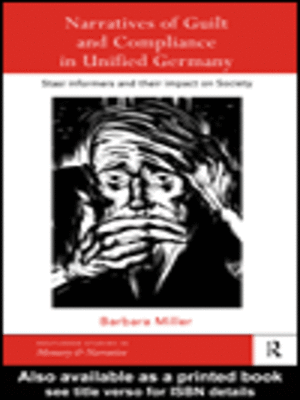Narratives of Guilt and Compliance in Unified Germany
ebook ∣ Stasi Informers and their Impact on Society · Routledge Studies in Memory and Narrative
By Barbara Miller

Sign up to save your library
With an OverDrive account, you can save your favorite libraries for at-a-glance information about availability. Find out more about OverDrive accounts.
Find this title in Libby, the library reading app by OverDrive.



Search for a digital library with this title
Title found at these libraries:
| Library Name | Distance |
|---|---|
| Loading... |
In 1992, the files of East Germany's infamous Ministry for State Security, the Stasi, were made publicly available and thousands of former East Germans began to confront their contents. Finally, it was possible for ordinary citizens to ascertain who had worked for the Stasi, either on a full-time basis or as an 'unofficial employee' or informer. The revelations from these 178 km of documents sparked feuds old and new among a population already struggling through massive social and political upheaval. Drawing upon the Stasi files and upon interviews with one-time informers, this book examines the impact of the Stasi legacy in united Germany.
Barbara Miller examines such aspects of the informer's experience as:
· the recruitment procedure
· daily life and work
· motivation and justification
She next considers the dealings of politicians and the courts with the Stasi and its employees. Her analysis then turns to the way in which this aspect of recent German history has been remembered, and the phenomenal impact of the opening of the files on such perceptions of the past. Narratives of Guilt and Compliance in Unified Germany offers important new perspectives on the nature of individual and collective memory and a fascinating investigation of modern German society.
Barbara Miller examines such aspects of the informer's experience as:
· the recruitment procedure
· daily life and work
· motivation and justification
She next considers the dealings of politicians and the courts with the Stasi and its employees. Her analysis then turns to the way in which this aspect of recent German history has been remembered, and the phenomenal impact of the opening of the files on such perceptions of the past. Narratives of Guilt and Compliance in Unified Germany offers important new perspectives on the nature of individual and collective memory and a fascinating investigation of modern German society.







